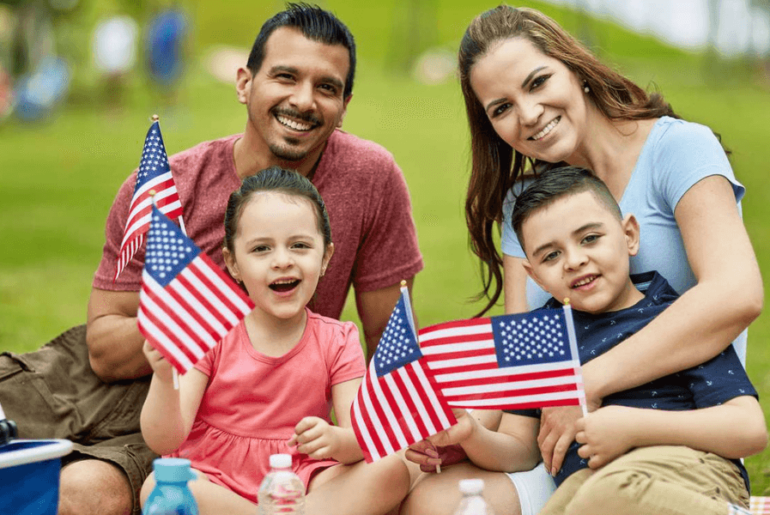If you’re new to the United States, you might be surprised by some American holiday traditions—no, we’re not talking about vacations. In the US, a “holiday” is what other countries refer to as a “bank” or “public holiday.” Here, the term “holiday” describes these celebration days. While the US shares many holidays with other parts of the world, there are distinct holidays rooted in its history and shaped by past cultural moments. In this article, we’ll explain the holidays in the United States and their celebrations.
Next, we will answer the following questions:
- How many holidays are there in the United States?
- What are the federal holidays in the United States?
- What criteria designate a holiday as a federal holiday?
- How are popular holidays celebrated in this country?
- What are state holidays?
- What are unofficial holidays in the United States?
What are the federal holidays in the United States?
A federal or public holiday in the US is a significant day officially recognized by the government. Aday must hold importance in the country’s history or values and requires an official declaration by Congress or the President to receive this designation. These holidays are observed nationwide and usually lead to the closure of federal government offices, schools, and many businesses. Here is a list of the 11 public holidays in the United States:
| Calendar Day | Holiday |
| Sunday, January 1* | New Year’s Day |
| Monday, January 16 | Martin Luther King, Jr. Day |
| Friday, January 20** | United States Presidential Inauguration |
| Monday, February 20 | Presidents’ Day |
| Monday, May 29 | Memorial Day / Day of Commemoration of the Fallen |
| Monday, June 19 | Juneteenth |
| Tuesday, July 4 | Independence Day |
| Monday, September 4 | Labor Day |
| Monday, October 9 | Columbus Day |
| Friday, November 10 | Veterans Day |
| Thursday, November 23 | Thanksgiving |
| Monday, December 25 | Christmas |
*Regulations for federal employees state that if a holiday falls on a Saturday, the previous Friday is considered a holiday for compensation and vacation purposes. Similarly, if a holiday falls on a Sunday, the following Monday is considered a holiday.
**This holiday is celebrated every four years after a presidential election.
How are popular holidays celebrated in this country?
In the United States, popular holidays have unique celebrations, each with its cherished traditions. For example:
- New Year’s Eve and New Year’s Day celebrate the transition from one year to the next with parties, fireworks, and countdowns. It’s a time for reflection, resolutions, and hopeful anticipation for the year ahead.
- Valentine’s Day is a day to express love and affection by exchanging romantic cards, flowers, chocolates, and gifts between partners, friends, and family.
- Memorial Day is a solemn day of remembrance for those who have died while serving in the US military. It often involves visiting cemeteries, placing flags on graves, and attending memorial services. Many families also use this day to kick off the summer with outdoor gatherings.
- Fourth of July is a major patriotic holiday commemorating the adoption of the Declaration of Independence on July 4, 1776. The day includes lively celebrations, such as fireworks displays, parades, concerts, barbecues, and outdoor activities.
- Labor Day (the first Monday in September) honors the contributions of workers and the labor movement. It signals the end of summer and often includes barbecues, picnics, and outdoor activities.
- Halloween is a lively and playful holiday celebrated with costumes, trick-or-treating, and spooky decorations. Children and adults dress up in creative costumes, going door-to-door to collect candy from neighbors. Haunted houses, pumpkin carvings, and festive parties contribute to the Halloween spirit.
- Thanksgiving is a cherished holiday centered around gratitude and sharing a bountiful meal with loved ones. Families and friends gather for a festive feast that typically includes turkey, stuffing, mashed potatoes, cranberry sauce, and pumpkin pie. The day often begins with watching Macy’s Thanksgiving Day Parade on television. It’s a time for reflection on blessings and spending quality time together.
- Christmas is widely celebrated in the United States, marked by religious observance and festive traditions. People adorn their homes with colorful lights, ornaments, and Christmas trees. Families exchange gifts and enjoy special meals together. Many attend Christmas Eve or Christmas Day church services to celebrate the birth of Jesus Christ. Caroling, baking, and watching holiday movies are also beloved traditions during this time.
What are state holidays?
In addition to federal holidays, each state has the authority to establish its holidays. These state holidays might honor local historical events, influential figures, or causes specific to that state. State holidays can vary widely from one state to another. For a list of state holidays, click here.
What are the unofficial holidays in the United States?
Unofficial holidays in the United States, sometimes called “holidays without a holiday,” lack formal recognition as federal or state holidays. Despite the absence of official designation, these days hold significance for specific groups, communities, or the general population. These holidays often stem from cultural, social, or humorous themes and have gained popularity over time. A few examples include:
- February 14: Valentine’s Day
- March 17: Saint Patrick’s Day
- April 9: Easter
- October 31: Halloween

